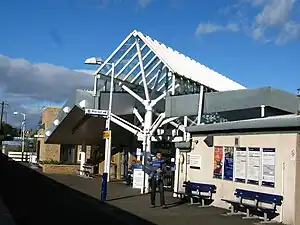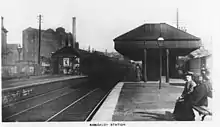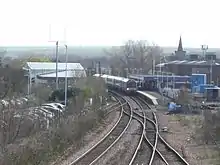 The southbound platform | |
| General information | |
| Location | Kirkcaldy, Fife Scotland |
| Coordinates | 56°06′43″N 3°10′02″W / 56.1119°N 3.1671°W |
| Grid reference | NT275916 |
| Managed by | ScotRail |
| Platforms | 2 |
| Other information | |
| Station code | KDY |
| Key dates | |
| 20 June 1847 | Opened |
| 1964 | Re-built |
| 1991 | South platform re-built |
| Passengers | |
| 2018/19 | |
| Interchange | 19,728 |
| 2019/20 | |
| Interchange | |
| 2020/21 | |
| Interchange | |
| 2021/22 | |
| Interchange | |
| 2022/23 | |
| Interchange | |
| Notes | |
Passenger statistics from the Office of Rail and Road | |

Kirkcaldy railway station is a railway station in the town of Kirkcaldy, Fife, Scotland. The station is managed by ScotRail and is on the Fife Circle Line and principal East Coast Main Line, 26 miles (42 km) north east of Edinburgh Waverley. British Transport Police maintain a small office on Platform 1.
The station is located on Station Road,[2] with an entrance on Whyte Melville Road. There are car parks on either side with an extension on the Whyte Melville Road side for Edinburgh commuter traffic.[3] The station building is situated on the Edinburgh platform. In the building is a ticket office (at street level), toilets, public phone, photo booth and shop.[4]
Platforms are adjoined by a connecting subway and a flight of stairs. Two lifts have recently been installed for north and south platform access.
There are waiting rooms on both platforms and CCTV is in operation. Train running information is provided via CIS displays, automatic announcements and customer help points.
There are three main railway station bus stops located on Bennochy Road (off Station Road) with access to the car park. A further two bus stops are located on Whyte Melville Road, one of which is adjacent to the entrance and the other opposite University of Dundee Nursing Kirkcaldy Campus.[2]
History
A proposal to bring two railway lines to the town had been suggested as far back as 1836, but neither plan succeeded. This led for pressure to support a new line from Burntisland to Newport-on-Tay and Tayport via Kinghorn, Kirkcaldy, Markinch and Cupar in 1840. However, it was three years before Parliament even acknowledged this essential plan. A unanimous decision was passed in favour by both the House of Lords and Commons.[5] Kirkcaldy railway station, along with now defunct stations in Sinclairtown and Dysart, finally opened on 20 June 1847[5][6] as part of the Edinburgh and Northern Railway, which terminated at Cupar. Train services were later taken over by the North British Railway, which was absorbed by the London and North Eastern Railway in 1923. The nationalised British Railways took over in 1948.
Originally, only the south platform was covered, until a re-fit of the station was undertaken towards the end of the 19th century.[5] In the late 19th and early 20th centuries, the station was surrounded by various Linoleum works, which had sidings allowing the product to be shipped via the main line.[7]
The station buildings survived intact until they were re-built in 1964, probably as part of the controversial town centre redevelopment plan. A fire in the late 1980s led to the destruction of the south platform. A new south platform had to be built again from scratch, and this was officially re-opened again to the public in 1991.[8]
Services


Southbound
- 2 trains per hour to Edinburgh Waverley (Semi-fast).
- 1 train per day to Edinburgh Waverley calling at all stations.
- 3 trains per day to London King's Cross and stations via the East Coast Main Line, plus a fourth that runs as far as Leeds.
- 1 train per day (except Saturdays) to London Euston (Caledonian Sleeper).
- 1 train per hour to Edinburgh Waverley (Limited Stop) Evenings only.
- 1 train per day to Penzance.
There is also a limited service to North Queensferry & Dalmeny.
On Sundays, there are two semi-fast trains per hour to Edinburgh and one all-stations local service.
Northbound
- 1 train per day to Glenrothes with Thornton (Peak Time)
- 1 train per hour to Perth
- 1 train per hour to Dundee
- 9 services per day to Aberdeen. ScotRail Edinburgh to Aberdeen services do not usually stop at Kirkcaldy (except during the a.m peak and in the late evening). 4 London North Eastern Railway services call during the daytime.[9] The Caledonian Sleeper also calls, but only to set down. CrossCountry's one train per day to Aberdeen also calls here.
On Sundays, there are hourly services to Dundee and northbound along the Fife Circle, plus two-hourly services to Aberdeen.
| Preceding station | Following station | |||
|---|---|---|---|---|
| Kinghorn | ScotRail Edinburgh–Dundee line |
Markinch | ||
| Kinghorn | ScotRail Fife Circle Line |
Markinch | ||
| Glenrothes with Thornton | ScotRail Fife Circle Line |
|||
| Inverkeithing | Caledonian Sleeper Highland Caledonian Sleeper |
Leuchars | ||
| Inverkeithing | London North Eastern Railway Northern Lights (London – Aberdeen) |
Leuchars | ||
| Inverkeithing | CrossCountry Cross Country Route |
Markinch | ||
| Future services | ||||
| Kinghorn | ScotRail Levenmouth rail link |
Cameron Bridge | ||
| Historical railways | ||||
| Sinclairtown Line open, station closed |
North British Railway Edinburgh and Northern Railway |
Kinghorn Line and station open | ||
References
Notes
- ↑ Brailsford 2017, Gaelic/English Station Index.
- 1 2 "fifedirect.org.uk: Kirkcaldy Railway Station".
- ↑ "Fife Today - Four-minute trip just to buy a ticket ..."
- ↑ Kirkaldy station facilities National Rail Enquiries
- 1 2 3 Eunson: Old Kirkcaldy (1998) p33
- ↑ Eunson: Old Dysart (1998) p24
- ↑ Historic Environment Scotland (1929). "Kirkcaldy, general view, showing Barry, Ostlere and Shepherd Caledonia Linoleum Works, Station Road and Kirkcaldy Museum and Art Gallery. Oblique aerial photograph taken facing north-west. (1315469)". Canmore.
- ↑ Kirkcaldy Civic Society (2000), Page 3
- ↑ GB National Rail Timetable May 2016, Table 229
Sources
- Brailsford, Martyn, ed. (December 2017) [1987]. Railway Track Diagrams 1: Scotland & Isle of Man (6th ed.). Frome: Trackmaps. ISBN 978-0-9549866-9-8.
- Butt, R. V. J. (October 1995). The Directory of Railway Stations: details every public and private passenger station, halt, platform and stopping place, past and present (1st ed.). Sparkford: Patrick Stephens Ltd. ISBN 978-1-85260-508-7. OCLC 60251199. OL 11956311M.
- Eunson, Eric (1998). Old Dysart and East Kirkcaldy. Ochiltree: Stenlake Publishing. ISBN 1-8403-3051-1. OCLC 40397429.
- Eunson, Eric (1998). Old Kirkcaldy: Central, North & West. Ochiltree: Stenlake Publishing. ISBN 1-8403-3052-X. OCLC 40801270.
- Jowett, Alan (March 1989). Jowett's Railway Atlas of Great Britain and Ireland: From Pre-Grouping to the Present Day (1st ed.). Sparkford: Patrick Stephens Ltd. ISBN 978-1-85260-086-0. OCLC 22311137.
- Kirkcaldy Civic Society (2000). Kirkcaldy walkabouts (6th ed.). Kirkcaldy: Kirkcaldy Civic Society. ISBN 0-9462-9419-4. OCLC 46810257.
- Yonge, John (May 1987). Gerald Jacobs (ed.). British Rail Track Diagrams - Book 1: ScotRail (1st ed.). Exeter: Quail Map Company. ISBN 0-9006-0948-6.
- Yonge, John (February 1993). Gerald Jacobs (ed.). Railway Track Diagrams - Book 1: Scotland and the Isle of Man (2nd ed.). Exeter: Quail Map Company. ISBN 0-9006-0995-8.
- Yonge, John (April 1996). Gerald Jacobs (ed.). Railway Track Diagrams - Book 1: Scotland and the Isle of Man (3rd ed.). Exeter: Quail Map Company. ISBN 1-8983-1919-7.
- Yonge, John (2007). Gerald Jacobs (ed.). Railway Track Diagrams - Book 1: Scotland & Isle of Man (Quail Track Plans) (fifth ed.). Bradford on Avon: Trackmaps (formerly Quail Map Co). ISBN 978-0-9549866-3-6. OCLC 79435248.
- Station information from Fife Council